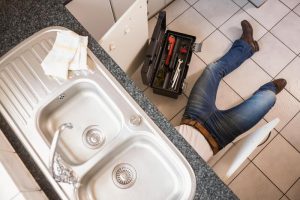Blocked drains can be classed as emergency plumbing so if you notice something amiss. Take action quickly.
It can take a while for a clog to build up and become obvious, but once a you have noticed something is wrong, it will get worse and quickly.
The backup of waste and water will often lead to unpleasant odors.
Typically, blockages occur in the narrower pipes of your home, such as sinks or toilets. However, debris can also build up in outdoor drains and cause a blockage.
By being aware of the common signs of a clogged drain to look out for, you can act quickly and fix the problem as soon as possible.
The signs
One of the most apparent signs of a clogged drain is when your toilet, shower, bathtub, or sink drains slowly. When a clog is nasty, the water may not drain at all.
With only one appliance having problems, the blockage is likely limited to a pipe connected to that particular appliance. If everything in the home looks to be affected, then the blockage will be outside in the gully trap or sewage pipes.
The toilet can help identify the extent of the problem – if flushing the toilet causes the water in the shower to rinse, or if running faucets causes the water in the toilet to rise, it is definitely a clogged drain.
So don’t forget to check the external drains and manhole covers on your property for signs of rising water – but only from the outside, as entering manholes is very risky due to the risk of gases and bacteria from the raw sewerage.
The Bad Smells
Foul odours are a clear indication of a block and can be one of the most apparent indicators of an underlying problem – if something has clogged the drain and started to rot, you’ll definitely notice it.
The foul odour can appear even before visible symptoms appear, so it’s important not to ignore unusual smells in the home that can’t be readily identified.
The Noises To Listen For
If your pipes and taps sound different than usual, it could be a sign of being blocked. Gurgling noises from drains, plug holes, toilet flushes and pipes are early warning signs – these sounds occur when air trapped in the pipes and being forced up through the system.

What To Do If You Suspect A Blockage
Each of the above signs is a cause for concern on its own, but if you notice two – or even all three – it’s time to address the problem head-on.
The first thing you should do is determine who is responsible for fixing the problem. Generally, you are only responsible for the parts of the system within your home’s boundaries and used exclusively by your home.
If a blockage is located within your property, you are responsible for clearing it.
However, if only part of the system is within the boundaries of your home and other parts are shared by neighbouring properties. The local water and sewer company is responsible.
With this knowledge, your next step should become clear.
If the blockage is somewhere outside your property, you simply need to report it to your water utility company.
On the other hand, you find evidence that the problem is within your property, then you should take direct action.
You can try unclogging the drain yourself, you can learn more about how to do so here.
However, if you’d rather talk to a plumber, you may need to contact an emergency plumber to clear it quickly
The Best Way To Unclog A Sink
Maintain your kitchen sinks and internal plumbing regularly to clear small clogs.
Small clogs when left will start to attract debris and slime until they become large clogs that block pipes completely.
If you’d rather use an eco-friendly product to keep your drains clear, you can ditch the caustic chemicals found in many caustic cleaners. Use baking soda ( bi carb soda) and vinegar instead.
Start by pouring boiling water down the drain, wait a few minutes, pour a cup of baking soda down the drain, and then add a cup of vinegar and another cup of hot water.
If the water is still running down the drain, slowly fill up the sink and place a plunger over the drain. Use the plunger carefully – if you push too hard, the pressure you create could break the seals on your pipes and cause a leak.
How To Clear A Blocked External Drains
A blocked external drain may seem like a big disaster, but it doesn’t have to be!. You can take steps to solve the problem and get your plumbing systems back up and running.
Need to know how to unclog an outdoor drain?
Step One: Assess the Problem
Get access to your outdoor drain by whatever method you can to open it. For most homes, this means removing the stormwater drain cover. You may need a screwdriver or crowbar to ease it open. Once you have access try and do a drain inspection.
Can you see a blockage on the surface or is it out of sight?
If you think you can handle the task yourself after assessing the problem yourself, proceed to step two. If the problem appears to be far more difficult than you expected, we recommend that you do not tackle the problem yourself and go to step six on this list.
You may also have clogged up gutters and downpipes that are easier to clean, although it’s still worth following the same steps.
Step two: get the right tools for the job.
The most important tool is a DIY drain snake or drain rod. They are long, thin, flexible and often have steel joints. The rod allows you to push through the clog in your drain and get deep into the external pipes. You can easily get them from a hardware store.
Do not bother to try and clear an exterior drain without one
You’ll also need protective clothing as you dig around in the drain. We recommend waterproof clothing – gloves and long sleeves – and protective clothing for your mouth and eyes.
Splashes can contain nasty sewage bacteria that you shouldn’t come into contact with, as they can cause illness or infection.
You’ll also need a bucket and a hose – ideally a pressure hose if you can access one.
Clogged outdoor drain pipes clogged with leaves.
Step 3: Remove any clogs you can reach.
Can you stick your arm in and clear out part of the clog? If so, this is your best chance to move the matter clogging your drains and make it easier to use your drain rods for easy debris removal.
It’s a disgusting job, but well worth it.
Take your bucket, place it next to the drain and start digging. Remove every piece of the clogged material possible. The more you can remove, the easier the next steps will be.
Step 4: Remove the clog.
Try using your drain rod to flush out the clog.
The narrow rod should slide straight through the sludge, although you may need to apply some pressure. Move the rods around to dislodge it. It may take some time and effort if the debris is very large or stubborn, so be patient. Keep submerging until the drainage rods can be moved easily When you can see the clump that is causing the block, it will start to drain and dissolve.
Always turn the rods clockwise. If you turn counterclockwise, stubborn clogs may cause the joints of your rods to come loose!
Step 5: Remove the extra debris
Once you’ve cleared the drain blockage and water is flowing through your outdoor drain again, take some extra time to make sure the problem doesn’t reoccur. Use a hose – preferably a pressure hose – and remove any excess debris accumulated around the drain.
The pressure from the hose should dislodge the remaining elements of the clog that you loosened with your hands or the drain snake. The cleaner you get your drains, the longer it will be before you have to do this again.
Step Six: How do you unclog a drain that won’t unclog?
Call a professional plumber.
Exterior drain problems tend are bigger problems than your usual clogged sink.
While they can be solved through DIY techniques, these methods aren’t always practical.
If they don’t work, we recommend that you don’t try more extreme techniques.
You may cause damage to your external drain and make the problem worse. You will need to call in a drain expert
How To Avoid Blocked Drains
The best way to avoid a claim on home insurance for water or sewerage damage is to take steps to prevent your drains from being damaged in the first place.
When blocked stormwater drains are preventing water from draining properly, the pressure in the drain can rise to dangerous levels and lead to a pipe break or leak and you will have a drain emergency on your hands.
Prevention Is The Best Method
If you’re lucky enough to avoid this problem, a clogged drain will still reduce the life expectancy of your plumbing system, and you may need emergency repairs in the future.
A few simple steps can greatly reduce the likelihood of your kitchen or bathroom drain becoming clogged. You don’t have to be overly vigilant when it comes to drain maintenance.
Here’s How To Prevent Clogged Drains
Install a strainer over your drain to prevent food waste from entering it, and clean it regularly.
The kitchen prevents food scraps from clogging the drain, and in the bathroom, it ensures that hair, soap, dental floss and cotton buds are caught before they enter the plug hole.
Measure your sinks plugs before you buy a drain strainer, as there are several different filter sizes.
If you don’t have a shower drain strainer, remove hair and other substances from the drain every time you take a bath or shower.
Never ever pour grease or oil down the drain. These will solidify when they cool down and other food particles get trapped in the oily grease build ups and you have a nasty blockage to clear. These can happen close to the sink or further down the system. If you have an island bench, Clearing this type of severe blockage is even harder to fix.
Oil and grease are the bread and butter for emergency plumbing services.
Many household drains are clogged after people casually pour cooking oil down them.
Even if the oil has found its way out of your internal pipes you’re not out of the woods yet, as external sewers and gully traps are regularly clogged by food .
Be Careful What You Flush !!
Similarly, if you flush nothing but human waste and toilet paper down the toilet. It may be tempting to dispose of baby wipes in the toilet, but these wipes don’t break down and decompose the same way toilet paper does and can easily clog your toilet.
Occasionally, there will be a plumbing emergency if a child flushes a toy down the toilet . If you have a child that is likely to do this, keep your toilet door closed.

Having trouble with clogged drains or your plumbing?
Clogged drains can have many causes, so it’s better to trust a drainage plumber
After all, you could make the problem worse and have to pay costly repairs to fix it.
The Article Blocked Drains – What To Do First Appeared ON
: https://gqcentral.co.uk


Comments are closed